Tourism and Development in Vanuatu
VerifiedAdded on 2020/04/01
|10
|2646
|224
AI Summary
This assignment analyzes the complex relationship between tourism and development in Vanuatu. It explores the economic benefits and drawbacks of tourism, its influence on cultural preservation and practices, and the role of government policies in shaping the industry. The analysis considers both positive aspects like job creation and infrastructure development, as well as potential negative impacts such as environmental degradation, commodification of culture, and corruption. The assignment draws on academic sources and reports to provide a comprehensive understanding of tourism's multifaceted influence on Vanuatu.
Contribute Materials
Your contribution can guide someone’s learning journey. Share your
documents today.
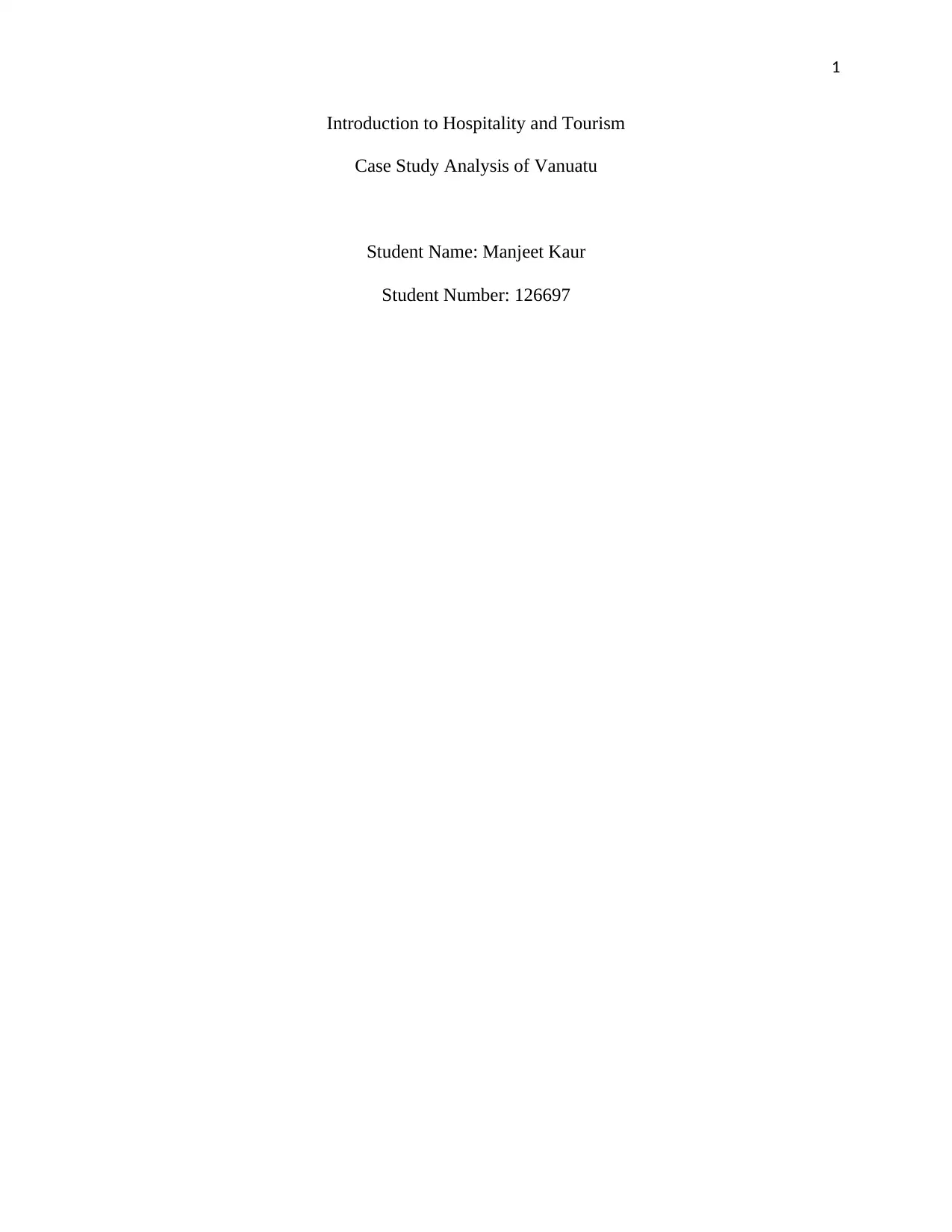
1
Introduction to Hospitality and Tourism
Case Study Analysis of Vanuatu
Student Name: Manjeet Kaur
Student Number: 126697
Introduction to Hospitality and Tourism
Case Study Analysis of Vanuatu
Student Name: Manjeet Kaur
Student Number: 126697
Secure Best Marks with AI Grader
Need help grading? Try our AI Grader for instant feedback on your assignments.
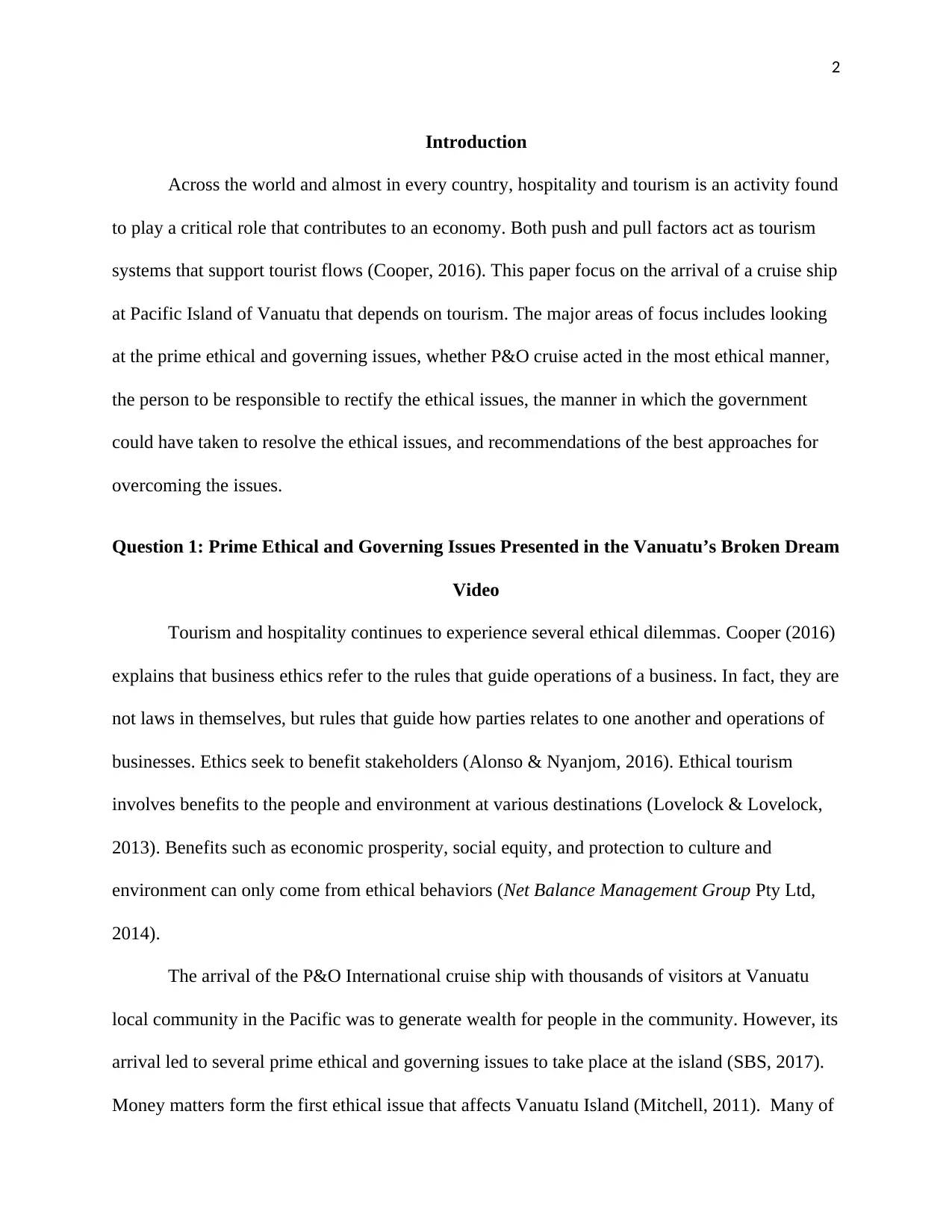
2
Introduction
Across the world and almost in every country, hospitality and tourism is an activity found
to play a critical role that contributes to an economy. Both push and pull factors act as tourism
systems that support tourist flows (Cooper, 2016). This paper focus on the arrival of a cruise ship
at Pacific Island of Vanuatu that depends on tourism. The major areas of focus includes looking
at the prime ethical and governing issues, whether P&O cruise acted in the most ethical manner,
the person to be responsible to rectify the ethical issues, the manner in which the government
could have taken to resolve the ethical issues, and recommendations of the best approaches for
overcoming the issues.
Question 1: Prime Ethical and Governing Issues Presented in the Vanuatu’s Broken Dream
Video
Tourism and hospitality continues to experience several ethical dilemmas. Cooper (2016)
explains that business ethics refer to the rules that guide operations of a business. In fact, they are
not laws in themselves, but rules that guide how parties relates to one another and operations of
businesses. Ethics seek to benefit stakeholders (Alonso & Nyanjom, 2016). Ethical tourism
involves benefits to the people and environment at various destinations (Lovelock & Lovelock,
2013). Benefits such as economic prosperity, social equity, and protection to culture and
environment can only come from ethical behaviors (Net Balance Management Group Pty Ltd,
2014).
The arrival of the P&O International cruise ship with thousands of visitors at Vanuatu
local community in the Pacific was to generate wealth for people in the community. However, its
arrival led to several prime ethical and governing issues to take place at the island (SBS, 2017).
Money matters form the first ethical issue that affects Vanuatu Island (Mitchell, 2011). Many of
Introduction
Across the world and almost in every country, hospitality and tourism is an activity found
to play a critical role that contributes to an economy. Both push and pull factors act as tourism
systems that support tourist flows (Cooper, 2016). This paper focus on the arrival of a cruise ship
at Pacific Island of Vanuatu that depends on tourism. The major areas of focus includes looking
at the prime ethical and governing issues, whether P&O cruise acted in the most ethical manner,
the person to be responsible to rectify the ethical issues, the manner in which the government
could have taken to resolve the ethical issues, and recommendations of the best approaches for
overcoming the issues.
Question 1: Prime Ethical and Governing Issues Presented in the Vanuatu’s Broken Dream
Video
Tourism and hospitality continues to experience several ethical dilemmas. Cooper (2016)
explains that business ethics refer to the rules that guide operations of a business. In fact, they are
not laws in themselves, but rules that guide how parties relates to one another and operations of
businesses. Ethics seek to benefit stakeholders (Alonso & Nyanjom, 2016). Ethical tourism
involves benefits to the people and environment at various destinations (Lovelock & Lovelock,
2013). Benefits such as economic prosperity, social equity, and protection to culture and
environment can only come from ethical behaviors (Net Balance Management Group Pty Ltd,
2014).
The arrival of the P&O International cruise ship with thousands of visitors at Vanuatu
local community in the Pacific was to generate wealth for people in the community. However, its
arrival led to several prime ethical and governing issues to take place at the island (SBS, 2017).
Money matters form the first ethical issue that affects Vanuatu Island (Mitchell, 2011). Many of
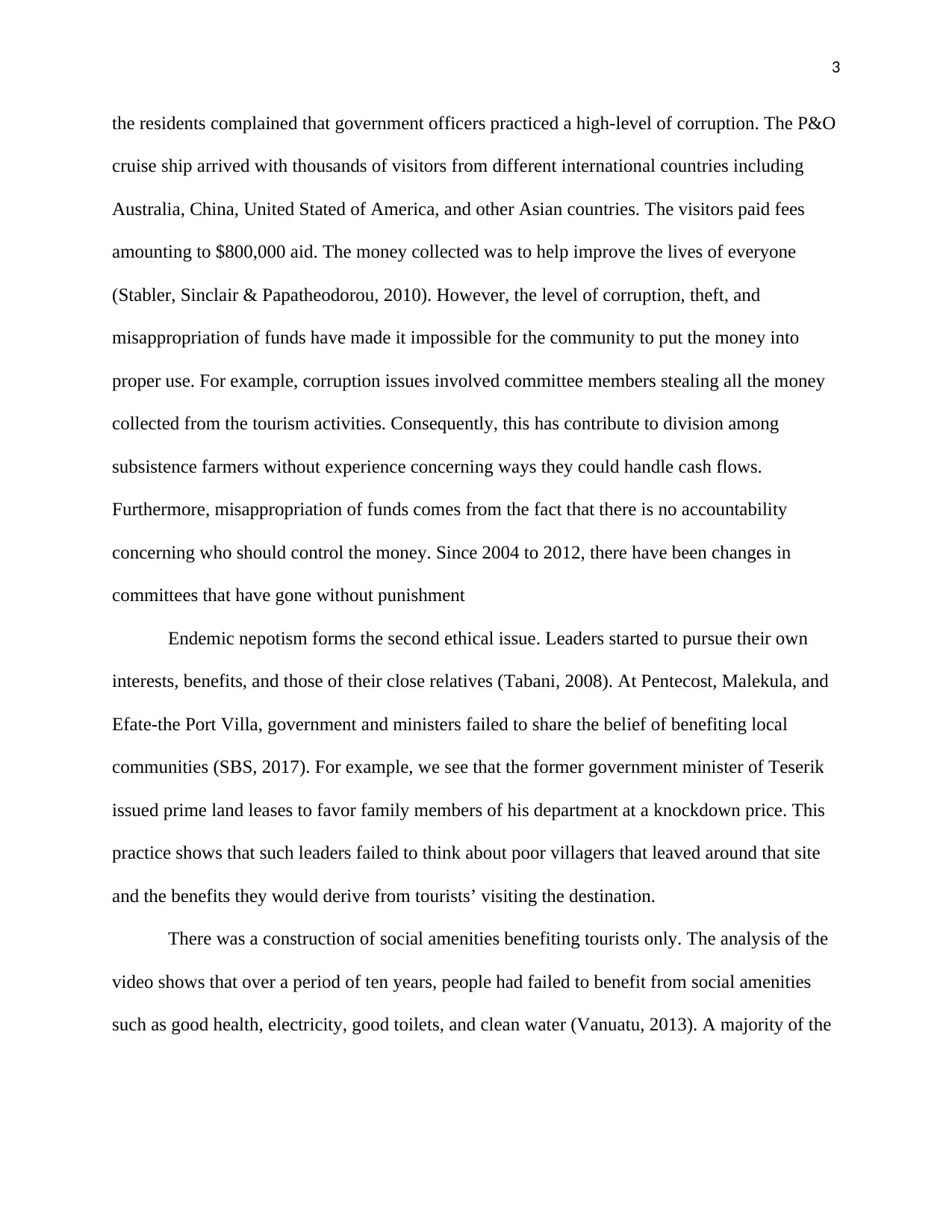
3
the residents complained that government officers practiced a high-level of corruption. The P&O
cruise ship arrived with thousands of visitors from different international countries including
Australia, China, United Stated of America, and other Asian countries. The visitors paid fees
amounting to $800,000 aid. The money collected was to help improve the lives of everyone
(Stabler, Sinclair & Papatheodorou, 2010). However, the level of corruption, theft, and
misappropriation of funds have made it impossible for the community to put the money into
proper use. For example, corruption issues involved committee members stealing all the money
collected from the tourism activities. Consequently, this has contribute to division among
subsistence farmers without experience concerning ways they could handle cash flows.
Furthermore, misappropriation of funds comes from the fact that there is no accountability
concerning who should control the money. Since 2004 to 2012, there have been changes in
committees that have gone without punishment
Endemic nepotism forms the second ethical issue. Leaders started to pursue their own
interests, benefits, and those of their close relatives (Tabani, 2008). At Pentecost, Malekula, and
Efate-the Port Villa, government and ministers failed to share the belief of benefiting local
communities (SBS, 2017). For example, we see that the former government minister of Teserik
issued prime land leases to favor family members of his department at a knockdown price. This
practice shows that such leaders failed to think about poor villagers that leaved around that site
and the benefits they would derive from tourists’ visiting the destination.
There was a construction of social amenities benefiting tourists only. The analysis of the
video shows that over a period of ten years, people had failed to benefit from social amenities
such as good health, electricity, good toilets, and clean water (Vanuatu, 2013). A majority of the
the residents complained that government officers practiced a high-level of corruption. The P&O
cruise ship arrived with thousands of visitors from different international countries including
Australia, China, United Stated of America, and other Asian countries. The visitors paid fees
amounting to $800,000 aid. The money collected was to help improve the lives of everyone
(Stabler, Sinclair & Papatheodorou, 2010). However, the level of corruption, theft, and
misappropriation of funds have made it impossible for the community to put the money into
proper use. For example, corruption issues involved committee members stealing all the money
collected from the tourism activities. Consequently, this has contribute to division among
subsistence farmers without experience concerning ways they could handle cash flows.
Furthermore, misappropriation of funds comes from the fact that there is no accountability
concerning who should control the money. Since 2004 to 2012, there have been changes in
committees that have gone without punishment
Endemic nepotism forms the second ethical issue. Leaders started to pursue their own
interests, benefits, and those of their close relatives (Tabani, 2008). At Pentecost, Malekula, and
Efate-the Port Villa, government and ministers failed to share the belief of benefiting local
communities (SBS, 2017). For example, we see that the former government minister of Teserik
issued prime land leases to favor family members of his department at a knockdown price. This
practice shows that such leaders failed to think about poor villagers that leaved around that site
and the benefits they would derive from tourists’ visiting the destination.
There was a construction of social amenities benefiting tourists only. The analysis of the
video shows that over a period of ten years, people had failed to benefit from social amenities
such as good health, electricity, good toilets, and clean water (Vanuatu, 2013). A majority of the
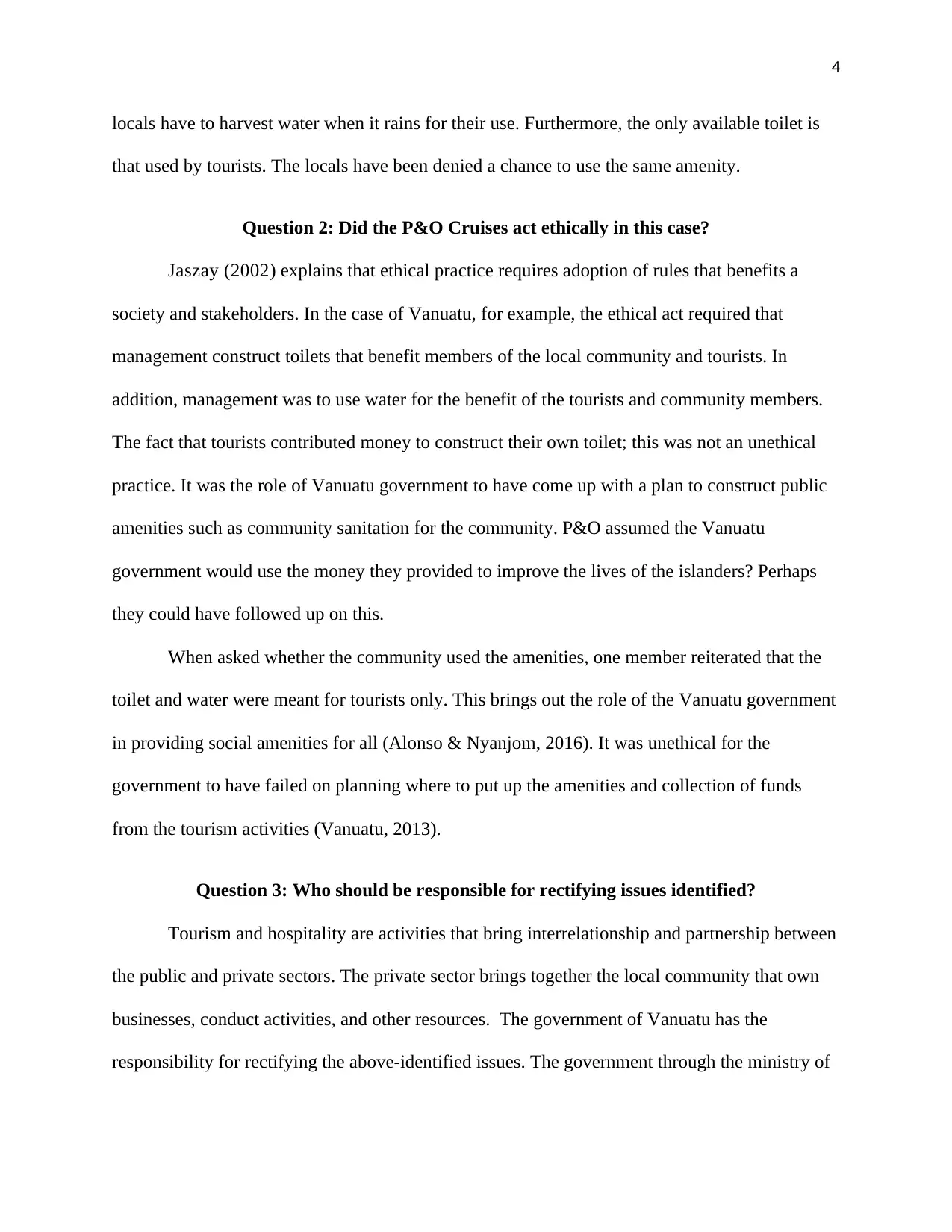
4
locals have to harvest water when it rains for their use. Furthermore, the only available toilet is
that used by tourists. The locals have been denied a chance to use the same amenity.
Question 2: Did the P&O Cruises act ethically in this case?
Jaszay (2002) explains that ethical practice requires adoption of rules that benefits a
society and stakeholders. In the case of Vanuatu, for example, the ethical act required that
management construct toilets that benefit members of the local community and tourists. In
addition, management was to use water for the benefit of the tourists and community members.
The fact that tourists contributed money to construct their own toilet; this was not an unethical
practice. It was the role of Vanuatu government to have come up with a plan to construct public
amenities such as community sanitation for the community. P&O assumed the Vanuatu
government would use the money they provided to improve the lives of the islanders? Perhaps
they could have followed up on this.
When asked whether the community used the amenities, one member reiterated that the
toilet and water were meant for tourists only. This brings out the role of the Vanuatu government
in providing social amenities for all (Alonso & Nyanjom, 2016). It was unethical for the
government to have failed on planning where to put up the amenities and collection of funds
from the tourism activities (Vanuatu, 2013).
Question 3: Who should be responsible for rectifying issues identified?
Tourism and hospitality are activities that bring interrelationship and partnership between
the public and private sectors. The private sector brings together the local community that own
businesses, conduct activities, and other resources. The government of Vanuatu has the
responsibility for rectifying the above-identified issues. The government through the ministry of
locals have to harvest water when it rains for their use. Furthermore, the only available toilet is
that used by tourists. The locals have been denied a chance to use the same amenity.
Question 2: Did the P&O Cruises act ethically in this case?
Jaszay (2002) explains that ethical practice requires adoption of rules that benefits a
society and stakeholders. In the case of Vanuatu, for example, the ethical act required that
management construct toilets that benefit members of the local community and tourists. In
addition, management was to use water for the benefit of the tourists and community members.
The fact that tourists contributed money to construct their own toilet; this was not an unethical
practice. It was the role of Vanuatu government to have come up with a plan to construct public
amenities such as community sanitation for the community. P&O assumed the Vanuatu
government would use the money they provided to improve the lives of the islanders? Perhaps
they could have followed up on this.
When asked whether the community used the amenities, one member reiterated that the
toilet and water were meant for tourists only. This brings out the role of the Vanuatu government
in providing social amenities for all (Alonso & Nyanjom, 2016). It was unethical for the
government to have failed on planning where to put up the amenities and collection of funds
from the tourism activities (Vanuatu, 2013).
Question 3: Who should be responsible for rectifying issues identified?
Tourism and hospitality are activities that bring interrelationship and partnership between
the public and private sectors. The private sector brings together the local community that own
businesses, conduct activities, and other resources. The government of Vanuatu has the
responsibility for rectifying the above-identified issues. The government through the ministry of
Secure Best Marks with AI Grader
Need help grading? Try our AI Grader for instant feedback on your assignments.
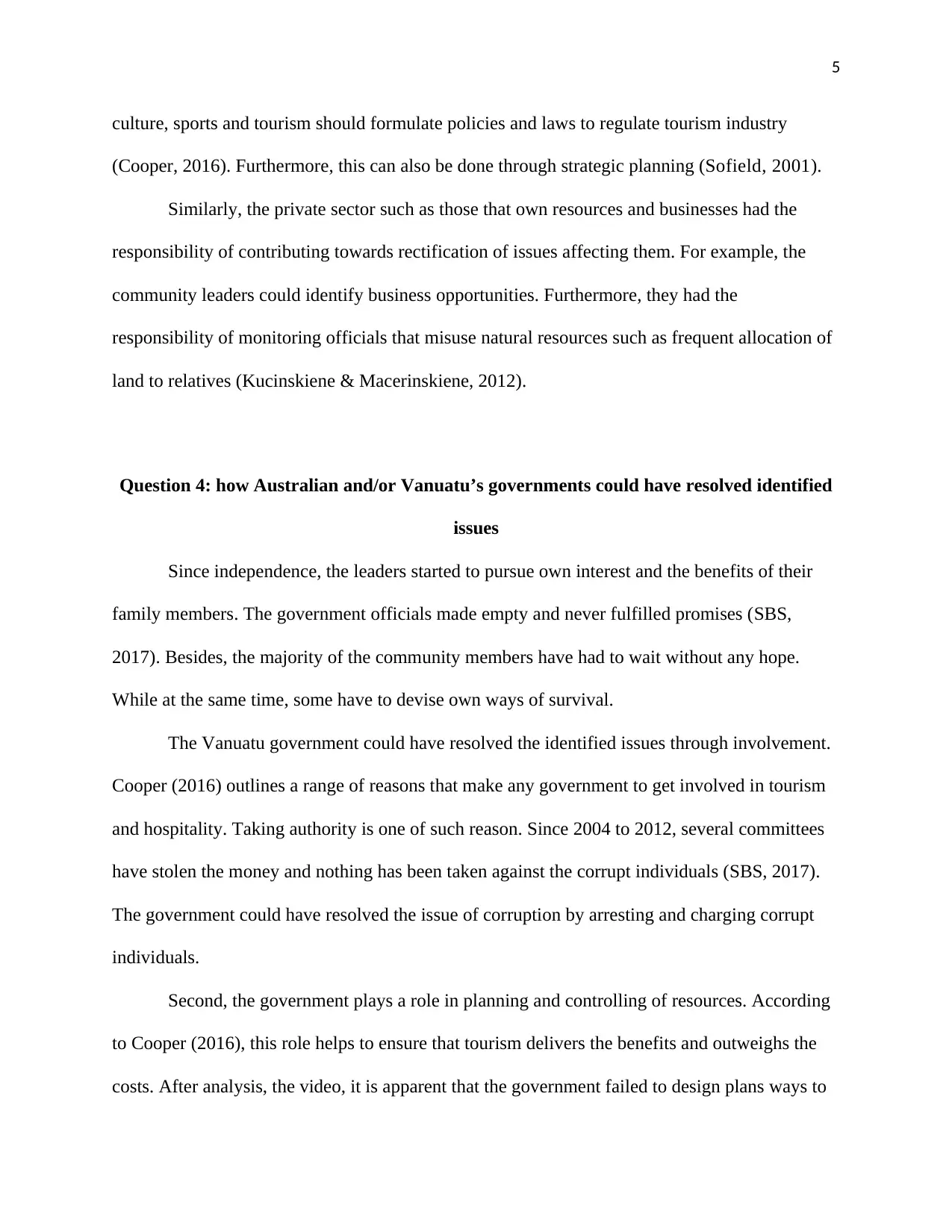
5
culture, sports and tourism should formulate policies and laws to regulate tourism industry
(Cooper, 2016). Furthermore, this can also be done through strategic planning (Sofield, 2001).
Similarly, the private sector such as those that own resources and businesses had the
responsibility of contributing towards rectification of issues affecting them. For example, the
community leaders could identify business opportunities. Furthermore, they had the
responsibility of monitoring officials that misuse natural resources such as frequent allocation of
land to relatives (Kucinskiene & Macerinskiene, 2012).
Question 4: how Australian and/or Vanuatu’s governments could have resolved identified
issues
Since independence, the leaders started to pursue own interest and the benefits of their
family members. The government officials made empty and never fulfilled promises (SBS,
2017). Besides, the majority of the community members have had to wait without any hope.
While at the same time, some have to devise own ways of survival.
The Vanuatu government could have resolved the identified issues through involvement.
Cooper (2016) outlines a range of reasons that make any government to get involved in tourism
and hospitality. Taking authority is one of such reason. Since 2004 to 2012, several committees
have stolen the money and nothing has been taken against the corrupt individuals (SBS, 2017).
The government could have resolved the issue of corruption by arresting and charging corrupt
individuals.
Second, the government plays a role in planning and controlling of resources. According
to Cooper (2016), this role helps to ensure that tourism delivers the benefits and outweighs the
costs. After analysis, the video, it is apparent that the government failed to design plans ways to
culture, sports and tourism should formulate policies and laws to regulate tourism industry
(Cooper, 2016). Furthermore, this can also be done through strategic planning (Sofield, 2001).
Similarly, the private sector such as those that own resources and businesses had the
responsibility of contributing towards rectification of issues affecting them. For example, the
community leaders could identify business opportunities. Furthermore, they had the
responsibility of monitoring officials that misuse natural resources such as frequent allocation of
land to relatives (Kucinskiene & Macerinskiene, 2012).
Question 4: how Australian and/or Vanuatu’s governments could have resolved identified
issues
Since independence, the leaders started to pursue own interest and the benefits of their
family members. The government officials made empty and never fulfilled promises (SBS,
2017). Besides, the majority of the community members have had to wait without any hope.
While at the same time, some have to devise own ways of survival.
The Vanuatu government could have resolved the identified issues through involvement.
Cooper (2016) outlines a range of reasons that make any government to get involved in tourism
and hospitality. Taking authority is one of such reason. Since 2004 to 2012, several committees
have stolen the money and nothing has been taken against the corrupt individuals (SBS, 2017).
The government could have resolved the issue of corruption by arresting and charging corrupt
individuals.
Second, the government plays a role in planning and controlling of resources. According
to Cooper (2016), this role helps to ensure that tourism delivers the benefits and outweighs the
costs. After analysis, the video, it is apparent that the government failed to design plans ways to
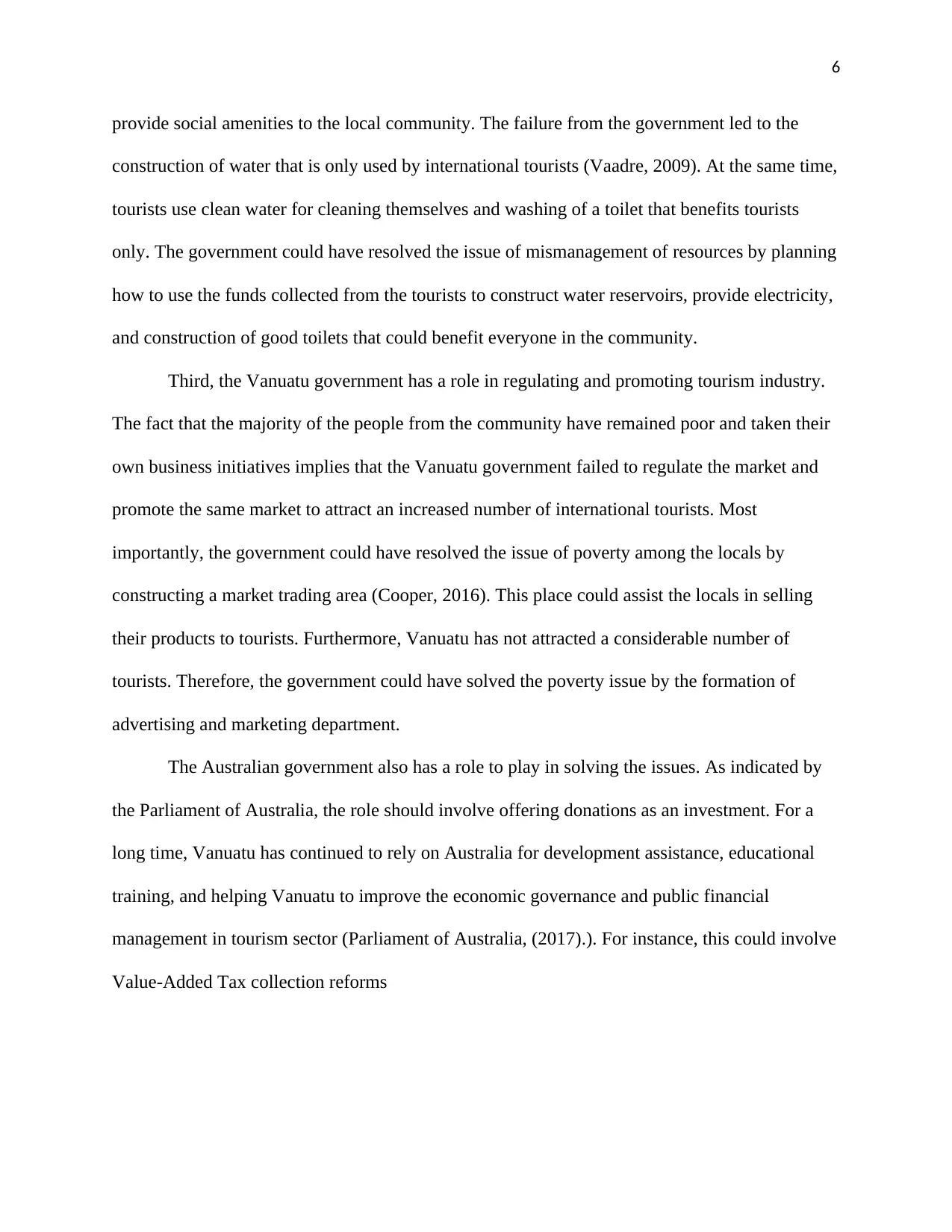
6
provide social amenities to the local community. The failure from the government led to the
construction of water that is only used by international tourists (Vaadre, 2009). At the same time,
tourists use clean water for cleaning themselves and washing of a toilet that benefits tourists
only. The government could have resolved the issue of mismanagement of resources by planning
how to use the funds collected from the tourists to construct water reservoirs, provide electricity,
and construction of good toilets that could benefit everyone in the community.
Third, the Vanuatu government has a role in regulating and promoting tourism industry.
The fact that the majority of the people from the community have remained poor and taken their
own business initiatives implies that the Vanuatu government failed to regulate the market and
promote the same market to attract an increased number of international tourists. Most
importantly, the government could have resolved the issue of poverty among the locals by
constructing a market trading area (Cooper, 2016). This place could assist the locals in selling
their products to tourists. Furthermore, Vanuatu has not attracted a considerable number of
tourists. Therefore, the government could have solved the poverty issue by the formation of
advertising and marketing department.
The Australian government also has a role to play in solving the issues. As indicated by
the Parliament of Australia, the role should involve offering donations as an investment. For a
long time, Vanuatu has continued to rely on Australia for development assistance, educational
training, and helping Vanuatu to improve the economic governance and public financial
management in tourism sector (Parliament of Australia, (2017).). For instance, this could involve
Value-Added Tax collection reforms
provide social amenities to the local community. The failure from the government led to the
construction of water that is only used by international tourists (Vaadre, 2009). At the same time,
tourists use clean water for cleaning themselves and washing of a toilet that benefits tourists
only. The government could have resolved the issue of mismanagement of resources by planning
how to use the funds collected from the tourists to construct water reservoirs, provide electricity,
and construction of good toilets that could benefit everyone in the community.
Third, the Vanuatu government has a role in regulating and promoting tourism industry.
The fact that the majority of the people from the community have remained poor and taken their
own business initiatives implies that the Vanuatu government failed to regulate the market and
promote the same market to attract an increased number of international tourists. Most
importantly, the government could have resolved the issue of poverty among the locals by
constructing a market trading area (Cooper, 2016). This place could assist the locals in selling
their products to tourists. Furthermore, Vanuatu has not attracted a considerable number of
tourists. Therefore, the government could have solved the poverty issue by the formation of
advertising and marketing department.
The Australian government also has a role to play in solving the issues. As indicated by
the Parliament of Australia, the role should involve offering donations as an investment. For a
long time, Vanuatu has continued to rely on Australia for development assistance, educational
training, and helping Vanuatu to improve the economic governance and public financial
management in tourism sector (Parliament of Australia, (2017).). For instance, this could involve
Value-Added Tax collection reforms
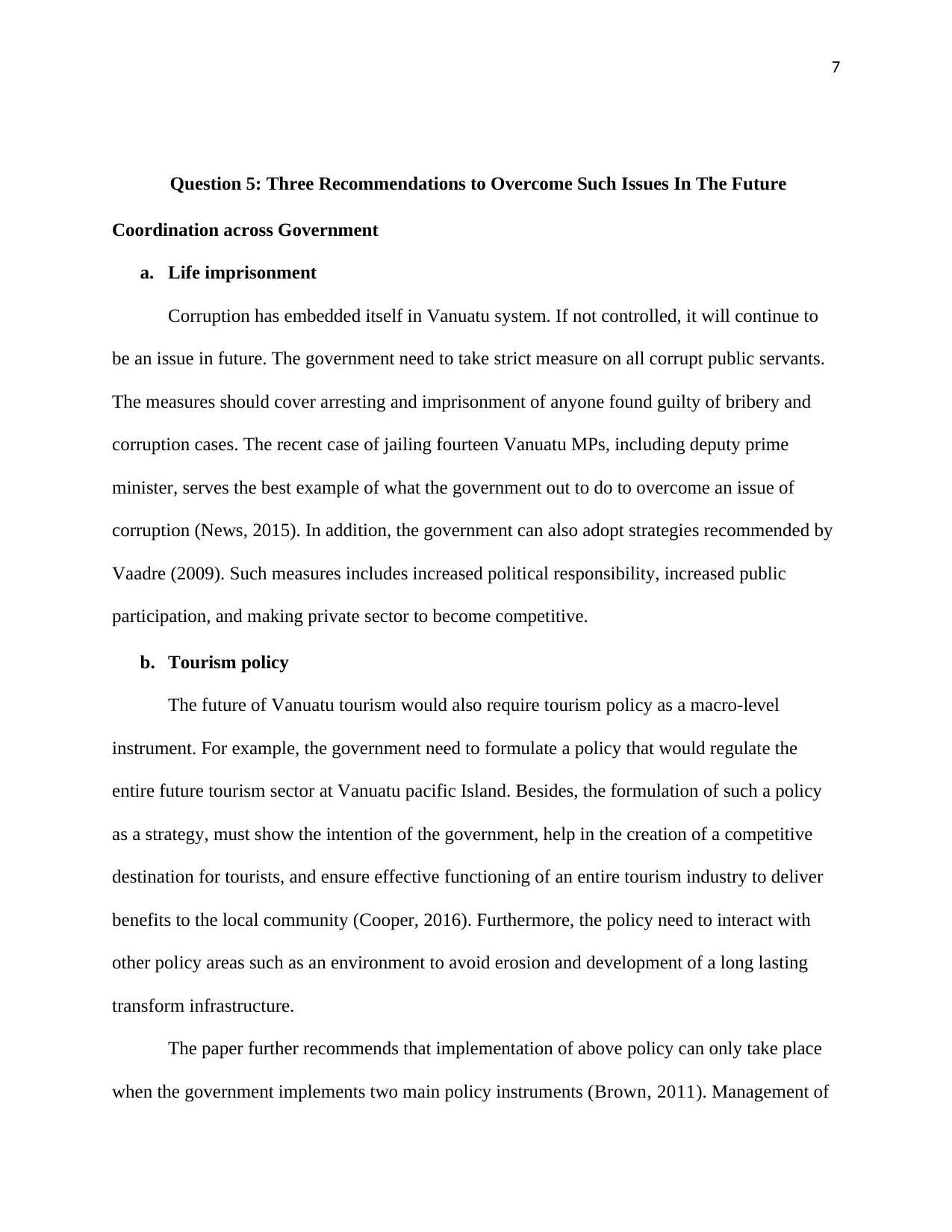
7
Question 5: Three Recommendations to Overcome Such Issues In The Future
Coordination across Government
a. Life imprisonment
Corruption has embedded itself in Vanuatu system. If not controlled, it will continue to
be an issue in future. The government need to take strict measure on all corrupt public servants.
The measures should cover arresting and imprisonment of anyone found guilty of bribery and
corruption cases. The recent case of jailing fourteen Vanuatu MPs, including deputy prime
minister, serves the best example of what the government out to do to overcome an issue of
corruption (News, 2015). In addition, the government can also adopt strategies recommended by
Vaadre (2009). Such measures includes increased political responsibility, increased public
participation, and making private sector to become competitive.
b. Tourism policy
The future of Vanuatu tourism would also require tourism policy as a macro-level
instrument. For example, the government need to formulate a policy that would regulate the
entire future tourism sector at Vanuatu pacific Island. Besides, the formulation of such a policy
as a strategy, must show the intention of the government, help in the creation of a competitive
destination for tourists, and ensure effective functioning of an entire tourism industry to deliver
benefits to the local community (Cooper, 2016). Furthermore, the policy need to interact with
other policy areas such as an environment to avoid erosion and development of a long lasting
transform infrastructure.
The paper further recommends that implementation of above policy can only take place
when the government implements two main policy instruments (Brown, 2011). Management of
Question 5: Three Recommendations to Overcome Such Issues In The Future
Coordination across Government
a. Life imprisonment
Corruption has embedded itself in Vanuatu system. If not controlled, it will continue to
be an issue in future. The government need to take strict measure on all corrupt public servants.
The measures should cover arresting and imprisonment of anyone found guilty of bribery and
corruption cases. The recent case of jailing fourteen Vanuatu MPs, including deputy prime
minister, serves the best example of what the government out to do to overcome an issue of
corruption (News, 2015). In addition, the government can also adopt strategies recommended by
Vaadre (2009). Such measures includes increased political responsibility, increased public
participation, and making private sector to become competitive.
b. Tourism policy
The future of Vanuatu tourism would also require tourism policy as a macro-level
instrument. For example, the government need to formulate a policy that would regulate the
entire future tourism sector at Vanuatu pacific Island. Besides, the formulation of such a policy
as a strategy, must show the intention of the government, help in the creation of a competitive
destination for tourists, and ensure effective functioning of an entire tourism industry to deliver
benefits to the local community (Cooper, 2016). Furthermore, the policy need to interact with
other policy areas such as an environment to avoid erosion and development of a long lasting
transform infrastructure.
The paper further recommends that implementation of above policy can only take place
when the government implements two main policy instruments (Brown, 2011). Management of
Paraphrase This Document
Need a fresh take? Get an instant paraphrase of this document with our AI Paraphraser
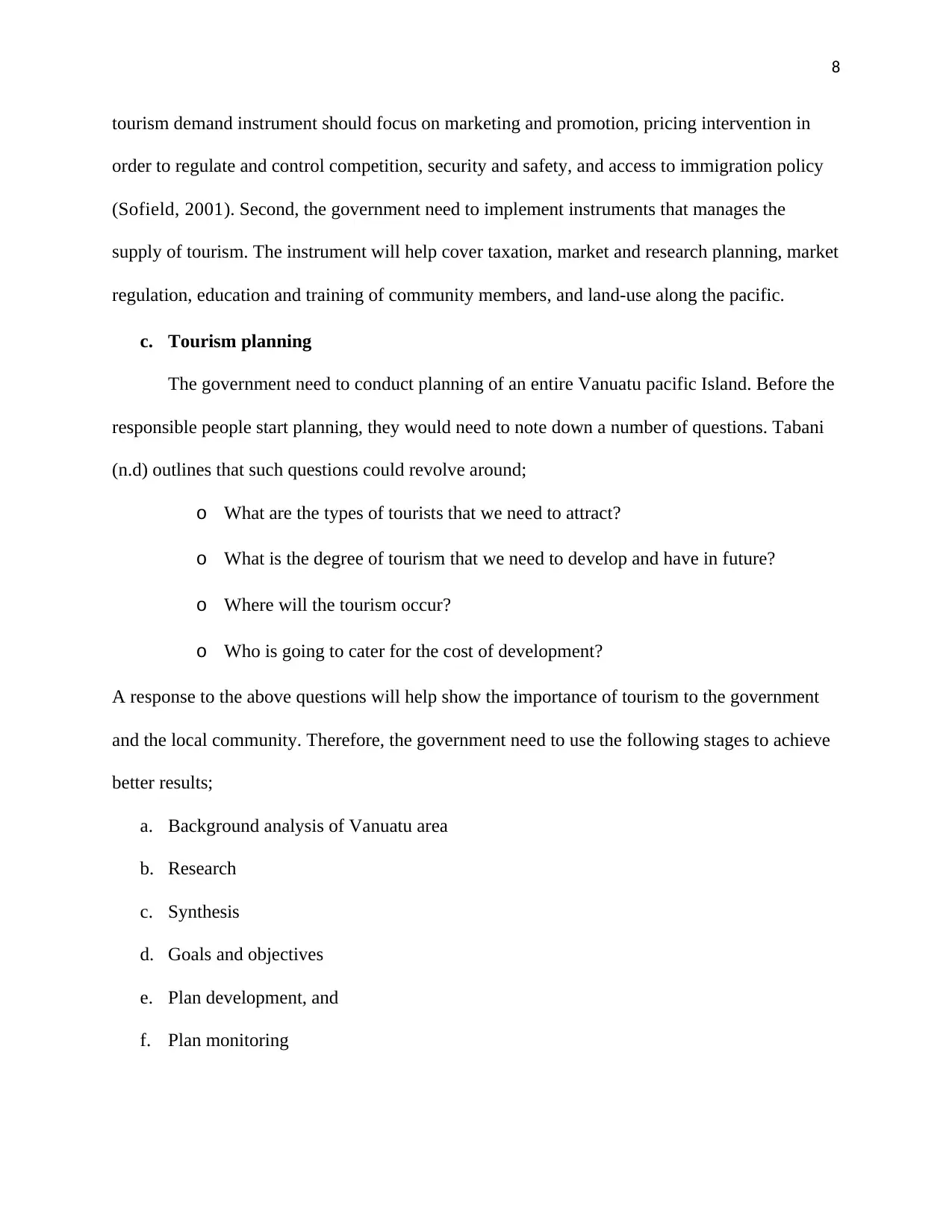
8
tourism demand instrument should focus on marketing and promotion, pricing intervention in
order to regulate and control competition, security and safety, and access to immigration policy
(Sofield, 2001). Second, the government need to implement instruments that manages the
supply of tourism. The instrument will help cover taxation, market and research planning, market
regulation, education and training of community members, and land-use along the pacific.
c. Tourism planning
The government need to conduct planning of an entire Vanuatu pacific Island. Before the
responsible people start planning, they would need to note down a number of questions. Tabani
(n.d) outlines that such questions could revolve around;
o What are the types of tourists that we need to attract?
o What is the degree of tourism that we need to develop and have in future?
o Where will the tourism occur?
o Who is going to cater for the cost of development?
A response to the above questions will help show the importance of tourism to the government
and the local community. Therefore, the government need to use the following stages to achieve
better results;
a. Background analysis of Vanuatu area
b. Research
c. Synthesis
d. Goals and objectives
e. Plan development, and
f. Plan monitoring
tourism demand instrument should focus on marketing and promotion, pricing intervention in
order to regulate and control competition, security and safety, and access to immigration policy
(Sofield, 2001). Second, the government need to implement instruments that manages the
supply of tourism. The instrument will help cover taxation, market and research planning, market
regulation, education and training of community members, and land-use along the pacific.
c. Tourism planning
The government need to conduct planning of an entire Vanuatu pacific Island. Before the
responsible people start planning, they would need to note down a number of questions. Tabani
(n.d) outlines that such questions could revolve around;
o What are the types of tourists that we need to attract?
o What is the degree of tourism that we need to develop and have in future?
o Where will the tourism occur?
o Who is going to cater for the cost of development?
A response to the above questions will help show the importance of tourism to the government
and the local community. Therefore, the government need to use the following stages to achieve
better results;
a. Background analysis of Vanuatu area
b. Research
c. Synthesis
d. Goals and objectives
e. Plan development, and
f. Plan monitoring
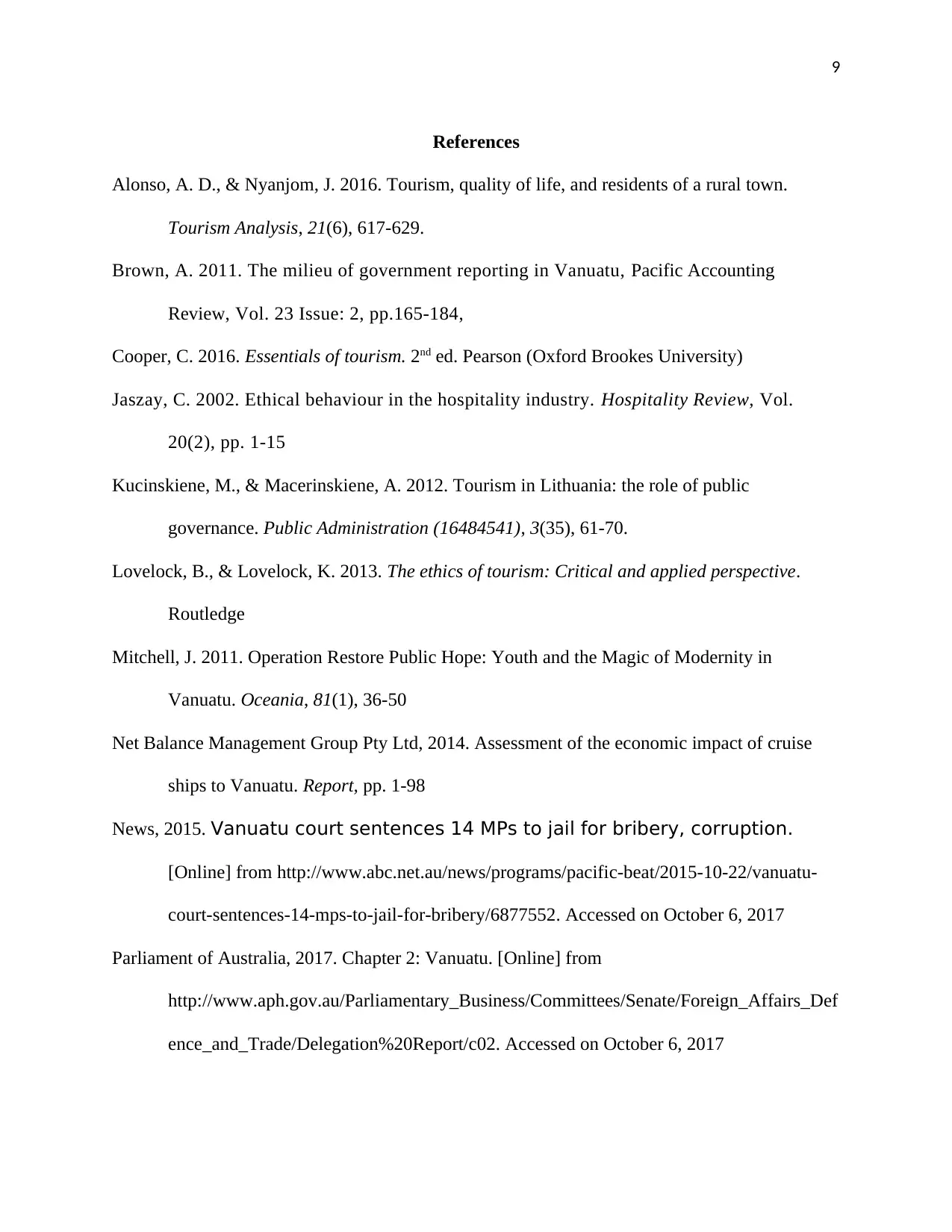
9
References
Alonso, A. D., & Nyanjom, J. 2016. Tourism, quality of life, and residents of a rural town.
Tourism Analysis, 21(6), 617-629.
Brown, A. 2011. The milieu of government reporting in Vanuatu, Pacific Accounting
Review, Vol. 23 Issue: 2, pp.165-184,
Cooper, C. 2016. Essentials of tourism. 2nd ed. Pearson (Oxford Brookes University)
Jaszay, C. 2002. Ethical behaviour in the hospitality industry. Hospitality Review, Vol.
20(2), pp. 1-15
Kucinskiene, M., & Macerinskiene, A. 2012. Tourism in Lithuania: the role of public
governance. Public Administration (16484541), 3(35), 61-70.
Lovelock, B., & Lovelock, K. 2013. The ethics of tourism: Critical and applied perspective.
Routledge
Mitchell, J. 2011. Operation Restore Public Hope: Youth and the Magic of Modernity in
Vanuatu. Oceania, 81(1), 36-50
Net Balance Management Group Pty Ltd, 2014. Assessment of the economic impact of cruise
ships to Vanuatu. Report, pp. 1-98
News, 2015. Vanuatu court sentences 14 MPs to jail for bribery, corruption.
[Online] from http://www.abc.net.au/news/programs/pacific-beat/2015-10-22/vanuatu-
court-sentences-14-mps-to-jail-for-bribery/6877552. Accessed on October 6, 2017
Parliament of Australia, 2017. Chapter 2: Vanuatu. [Online] from
http://www.aph.gov.au/Parliamentary_Business/Committees/Senate/Foreign_Affairs_Def
ence_and_Trade/Delegation%20Report/c02. Accessed on October 6, 2017
References
Alonso, A. D., & Nyanjom, J. 2016. Tourism, quality of life, and residents of a rural town.
Tourism Analysis, 21(6), 617-629.
Brown, A. 2011. The milieu of government reporting in Vanuatu, Pacific Accounting
Review, Vol. 23 Issue: 2, pp.165-184,
Cooper, C. 2016. Essentials of tourism. 2nd ed. Pearson (Oxford Brookes University)
Jaszay, C. 2002. Ethical behaviour in the hospitality industry. Hospitality Review, Vol.
20(2), pp. 1-15
Kucinskiene, M., & Macerinskiene, A. 2012. Tourism in Lithuania: the role of public
governance. Public Administration (16484541), 3(35), 61-70.
Lovelock, B., & Lovelock, K. 2013. The ethics of tourism: Critical and applied perspective.
Routledge
Mitchell, J. 2011. Operation Restore Public Hope: Youth and the Magic of Modernity in
Vanuatu. Oceania, 81(1), 36-50
Net Balance Management Group Pty Ltd, 2014. Assessment of the economic impact of cruise
ships to Vanuatu. Report, pp. 1-98
News, 2015. Vanuatu court sentences 14 MPs to jail for bribery, corruption.
[Online] from http://www.abc.net.au/news/programs/pacific-beat/2015-10-22/vanuatu-
court-sentences-14-mps-to-jail-for-bribery/6877552. Accessed on October 6, 2017
Parliament of Australia, 2017. Chapter 2: Vanuatu. [Online] from
http://www.aph.gov.au/Parliamentary_Business/Committees/Senate/Foreign_Affairs_Def
ence_and_Trade/Delegation%20Report/c02. Accessed on October 6, 2017
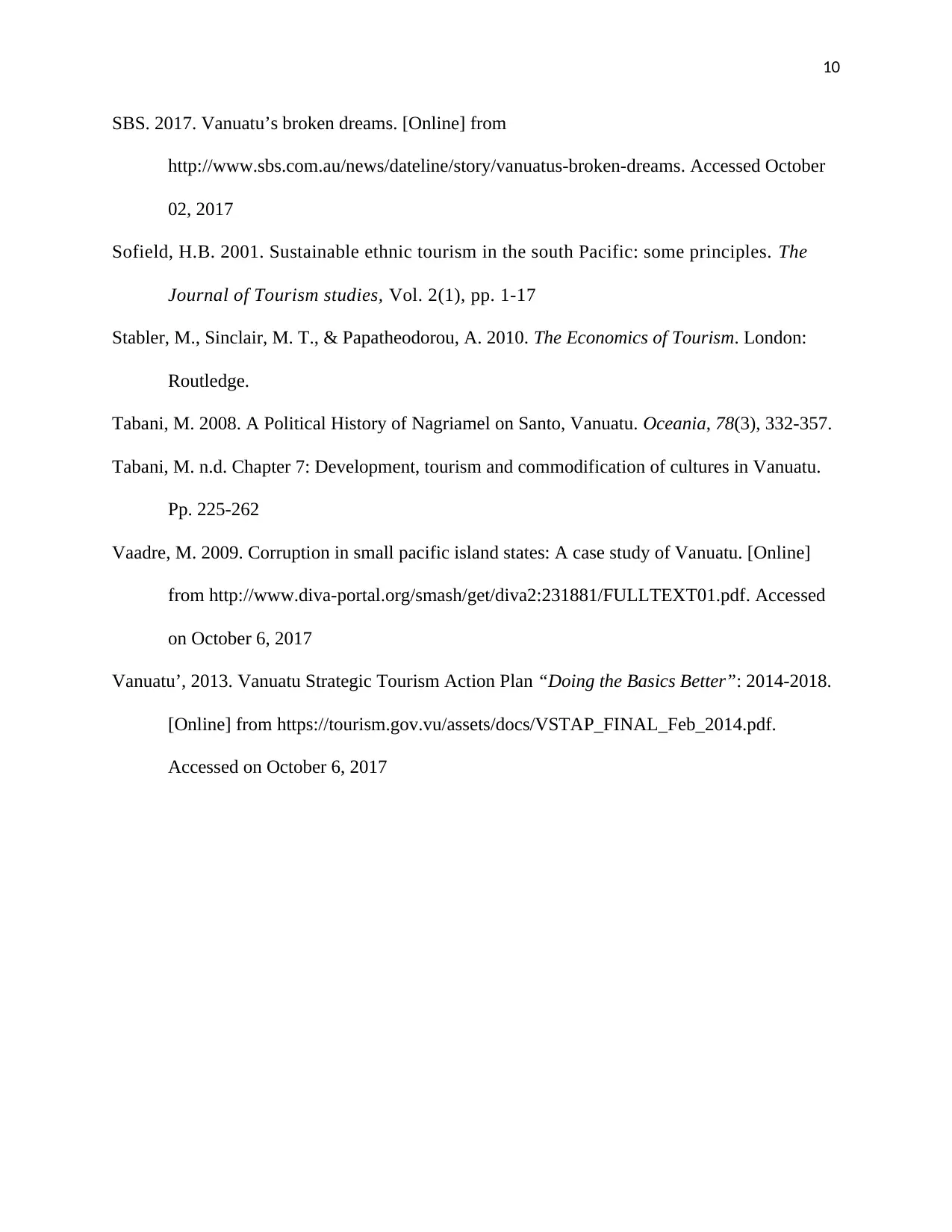
10
SBS. 2017. Vanuatu’s broken dreams. [Online] from
http://www.sbs.com.au/news/dateline/story/vanuatus-broken-dreams. Accessed October
02, 2017
Sofield, H.B. 2001. Sustainable ethnic tourism in the south Pacific: some principles. The
Journal of Tourism studies, Vol. 2(1), pp. 1-17
Stabler, M., Sinclair, M. T., & Papatheodorou, A. 2010. The Economics of Tourism. London:
Routledge.
Tabani, M. 2008. A Political History of Nagriamel on Santo, Vanuatu. Oceania, 78(3), 332-357.
Tabani, M. n.d. Chapter 7: Development, tourism and commodification of cultures in Vanuatu.
Pp. 225-262
Vaadre, M. 2009. Corruption in small pacific island states: A case study of Vanuatu. [Online]
from http://www.diva-portal.org/smash/get/diva2:231881/FULLTEXT01.pdf. Accessed
on October 6, 2017
Vanuatu’, 2013. Vanuatu Strategic Tourism Action Plan “Doing the Basics Better”: 2014-2018.
[Online] from https://tourism.gov.vu/assets/docs/VSTAP_FINAL_Feb_2014.pdf.
Accessed on October 6, 2017
SBS. 2017. Vanuatu’s broken dreams. [Online] from
http://www.sbs.com.au/news/dateline/story/vanuatus-broken-dreams. Accessed October
02, 2017
Sofield, H.B. 2001. Sustainable ethnic tourism in the south Pacific: some principles. The
Journal of Tourism studies, Vol. 2(1), pp. 1-17
Stabler, M., Sinclair, M. T., & Papatheodorou, A. 2010. The Economics of Tourism. London:
Routledge.
Tabani, M. 2008. A Political History of Nagriamel on Santo, Vanuatu. Oceania, 78(3), 332-357.
Tabani, M. n.d. Chapter 7: Development, tourism and commodification of cultures in Vanuatu.
Pp. 225-262
Vaadre, M. 2009. Corruption in small pacific island states: A case study of Vanuatu. [Online]
from http://www.diva-portal.org/smash/get/diva2:231881/FULLTEXT01.pdf. Accessed
on October 6, 2017
Vanuatu’, 2013. Vanuatu Strategic Tourism Action Plan “Doing the Basics Better”: 2014-2018.
[Online] from https://tourism.gov.vu/assets/docs/VSTAP_FINAL_Feb_2014.pdf.
Accessed on October 6, 2017
1 out of 10
Related Documents
Your All-in-One AI-Powered Toolkit for Academic Success.
+13062052269
info@desklib.com
Available 24*7 on WhatsApp / Email
![[object Object]](/_next/static/media/star-bottom.7253800d.svg)
Unlock your academic potential
© 2024 | Zucol Services PVT LTD | All rights reserved.





